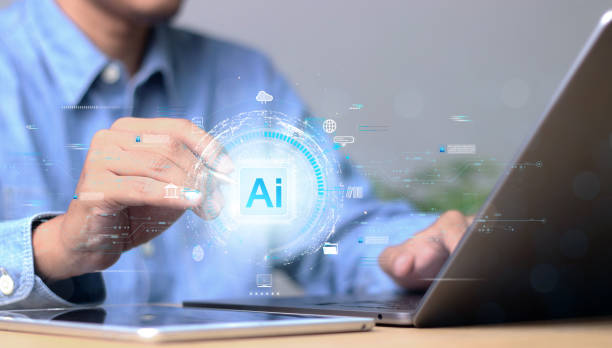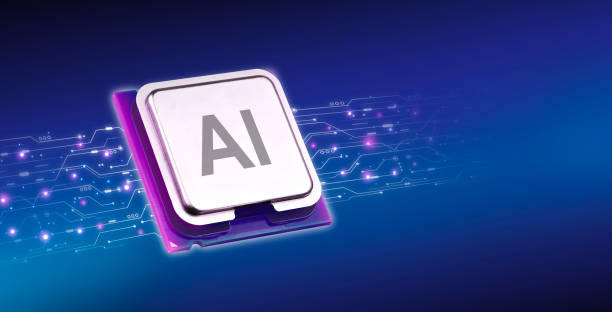Artificial Intelligence and the Revolution It Creates in Jobs
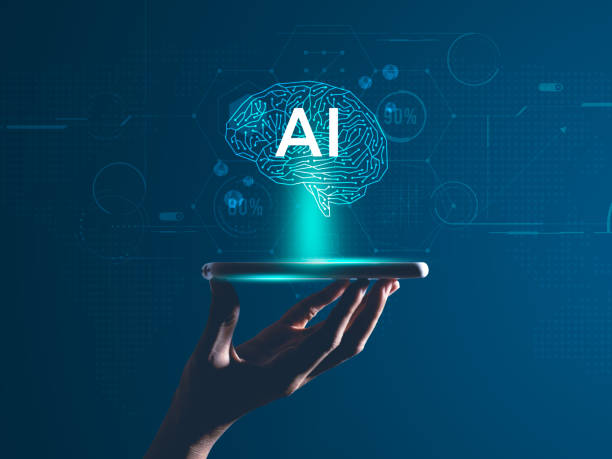
Artificial Intelligence (AI) is no longer a science fiction concept; instead, it is rapidly becoming a main driving force in all aspects of modern life, especially in the #job_market and #job_transformations.
With stunning advancements in machine learning, natural language processing, and computer vision, AI has brought forth new capabilities that previously only existed in our imaginations.
This technology not only transforms our work tools and processes but also redefines many jobs and even eliminates some entirely, while opening new doors to unprecedented job opportunities.
The fundamental question occupying many minds is: what will be the future of AI in jobs, and what impacts will it have on our professional lives? Should we fear these changes or prepare to welcome a new era? These transformations have sparked widespread discussions about the role of humans in the future economy and highlighted the need to rethink skills, education, and business models.
A correct understanding of this phenomenon and its consequences is vital for every individual and organization to align themselves with the massive wave of changes it brings.
These fundamental changes affect not only traditional industries but also emerging fields, compelling us to consider the capacities and limitations of human-machine collaboration.
Is your current e-commerce website design causing you to lose customers and sales?
Rasaweb is your solution with modern and user-friendly e-commerce website designs!
✅ Significant increase in conversion rates and sales
✅ Creation of strong branding and customer trust
⚡ Get a free consultation for e-commerce website design from Rasaweb!
Current Impacts of Artificial Intelligence on Various Industries
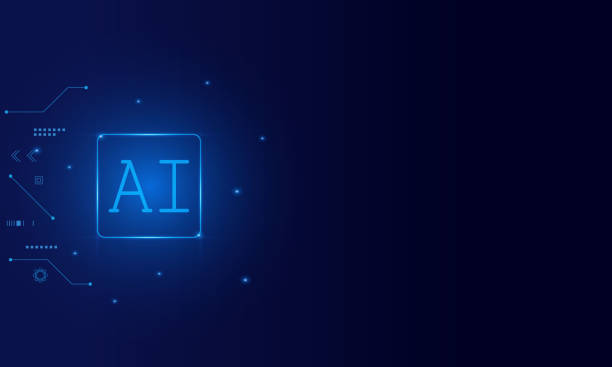
Artificial intelligence has now permeated many industries and is restructuring traditional job frameworks.
In the manufacturing sector, smart robots and automated systems perform repetitive and hazardous tasks with high precision and speed, leading to increased productivity and reduced need for human labor on assembly lines.
In the customer service industry, AI-powered chatbots and virtual assistants handle frequently asked questions and provide initial support, allowing human experts to focus on more complex issues and personalized interactions.
In the financial sector, AI algorithms are used in fraud detection, market analysis, and risk management, processing vast amounts of data with unparalleled speed and accuracy, beyond human capabilities.
Even in the healthcare sector, AI plays a vital role in disease diagnosis, drug discovery, and personalized treatment planning, assisting doctors in making better decisions.
These developments indicate that the AI job revolution is not a futuristic phenomenon, but an ongoing reality.
Companies like Amazon and Tesla are prime examples of deep AI integration in their operations, demonstrating structural changes in the global labor market.
These changes require redefining job roles, retraining employees, and developing new skills for coexistence with these advanced technologies.
Undoubtedly, these phenomena are just the beginning, and AI’s impact on other aspects of human life will become more prominent in the future.
Jobs at Risk of Automation with Artificial Intelligence
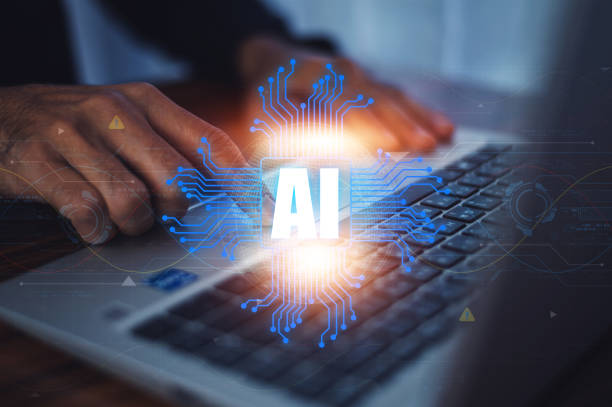
Although AI creates new opportunities, one cannot overlook the fact that many jobs are also at risk of full or partial automation.
Generally, jobs involving repetitive, predictable tasks, based on structured data, and requiring little creativity or high emotional intelligence, are most vulnerable.
For example, production line operators, data entry clerks, accounting staff in repetitive sections, and even heavy vehicle drivers are gradually giving way to robots and autonomous systems.
It is predicted that the future AI job path for these types of jobs will be challenging.
This does not mean these jobs will disappear entirely, but rather their nature will change, and the need for supervisory and maintenance skills for AI systems will increase.
Automation, especially with the development of advanced AI, has the potential to replace human labor on a large scale, which requires precise social and economic planning to prevent widespread unemployment and social inequalities.
| Job Title | Automation Risk | Description |
|---|---|---|
| Data Entry Operator | High | Repetitive and rule-based tasks easily performed by algorithms. |
| Accounting Staff (Transaction Processing) | High | Invoice management, account reconciliation, and simple financial reporting. |
| Production Line Operator | High | Repetitive assembly and quality control achievable by robots. |
| Customer Service Representative (Initial Response) | Medium to High | Answering frequently asked questions and providing general information by chatbots. |
New Job Opportunities Arising from AI Development
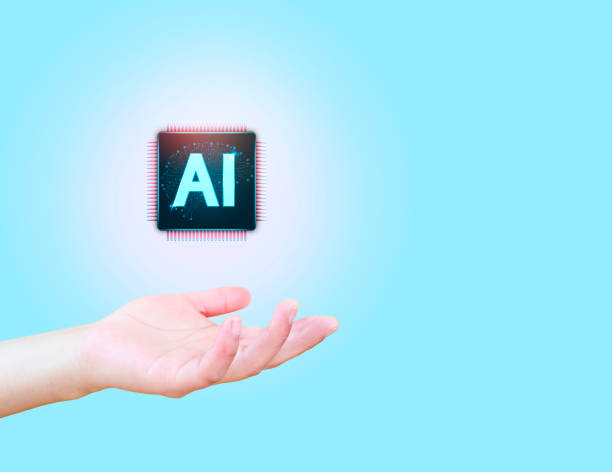
Alongside the elimination and alteration of some jobs, the development of artificial intelligence has also led to the creation of new and exciting job opportunities.
Many of these roles did not exist before and have emerged with technological advancements.
The future of AI jobs is not limited to engineers and data scientists but will encompass a wide range of specializations.
Roles such as Prompt Engineers, who specialize in designing and optimizing instructions for large language models, or AI ethics specialists, whose task is to ensure the responsible development and use of AI, are examples of these emerging jobs.
Furthermore, the demand for cybersecurity specialists to protect AI systems and AI engineers responsible for designing, implementing, and maintaining AI systems is rapidly increasing.
User Experience Designers (UX Designers), who focus on human-AI interaction, will also play a key role.
These new jobs represent a paradigm shift from manual and repetitive tasks towards intellectual, creative, and supervisory roles that require high-level skills in systemic thinking and problem-solving.
Companies and governments must invest in this area to prepare the workforce to leverage these opportunities.
Tired of losing business opportunities due to not having a professional corporate website? Don’t worry anymore! With Rasaweb’s corporate website design services:
✅ Your brand’s credibility and professionalism will increase.
✅ You will attract more customers and sales leads.
⚡ Get a free consultation now to get started!
Essential Skills for Adapting to the AI Era
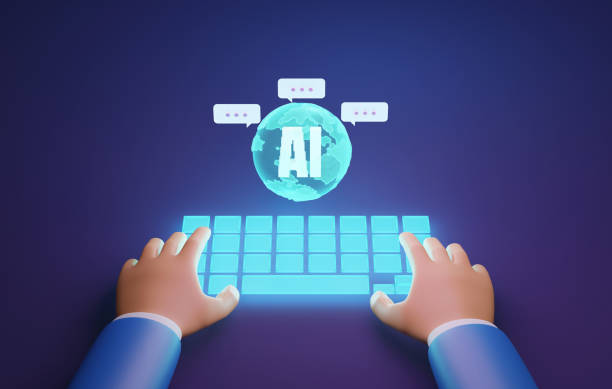
To succeed in the future of AI jobs, developing skills where AI is weaker or entirely lacks capability will be crucial.
These skills include soft skills and more complex cognitive abilities inherent to human nature.
Critical thinking and complex problem-solving are among the abilities where AI can assist, but final decision-making and a complete understanding of a problem’s dimensions still require human intelligence.
Creativity and innovation, especially in generating novel and unexpected ideas, will remain the domain of human superiority.
Emotional intelligence and empathy remain highly valuable for roles involving complex human interactions such as management, consulting, and healthcare.
Lifelong learning and adaptability to rapid changes will also become essential skills, as technologies and labor market needs are evolving quickly.
The ability to collaborate with AI and understand its limitations is also of great importance.
These skills help individuals collaborate with AI and create added value, rather than competing against it.
Educational and personal development programs should focus on strengthening these skills to prepare individuals for future roles.
The Role of Education in Preparing the Workforce for AI
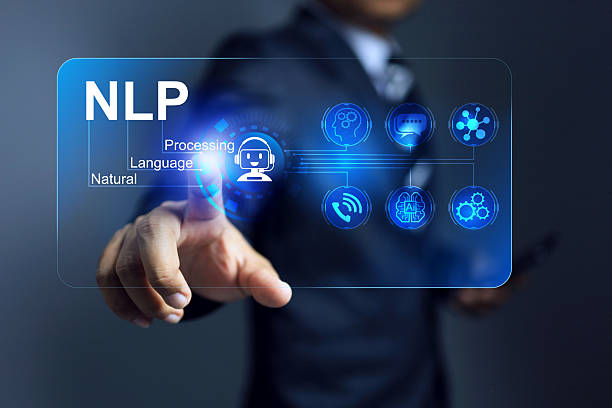
Education systems worldwide must align themselves with the pace of AI developments to cultivate a workforce ready for the AI job world.
This change requires a fundamental rethinking of curricula, teaching methods, and even the overall goal of education.
A greater emphasis on STEM (Science, Technology, Engineering, Mathematics) skills is essential, but the importance of soft and interdisciplinary skills should not be overlooked.
Education should shift towards developing systemic thinking, problem-solving, creativity, and critical thinking abilities, instead of merely focusing on memorizing information.
Universities and higher education institutions must offer new courses in AI, AI ethics, human-machine interaction, and data analysis.
Additionally, Reskilling and Upskilling programs for the current workforce are of particular importance, so that individuals whose jobs are at risk of automation can acquire new skills and transition into new roles.
These changes must begin from an early age, and education should include digital literacy and a basic understanding of how AI works, so that future generations can operate with confidence in this new work environment.
Ethical and Social Challenges of AI’s Job Future

The rapid development of artificial intelligence, in addition to opportunities, also presents complex ethical and social challenges that directly impact the future of AI jobs.
One of the most significant concerns is economic inequality.
If AI leads to widespread replacement of human labor and sufficient retraining opportunities are not provided, the gap between highly skilled and low-skilled individuals could widen, leading to increased inequality and unemployment.
Issues related to privacy and data security are also of particular importance, as AI systems require vast amounts of personal information for their operation.
Bias in algorithms, which can lead to discrimination in hiring, lending, or even crime detection, is another serious ethical concern.
Questions regarding intellectual property of AI outputs and accountability for its errors are also raised.
Some experts have even raised discussions about the concept of Universal Basic Income (UBI) as a solution to support individuals whose jobs have been displaced by AI.
These challenges require comprehensive legal frameworks, international cooperation, and public discourse about the future we wish to build with artificial intelligence.
| Challenge | Explanation | Potential Solution |
|---|---|---|
| Increased Inequality | Replacement of low-skill jobs by AI, widening class gap. | Extensive retraining programs, universal basic income, robot taxes. |
| Algorithmic Bias | Reflection of existing biases in AI training data. | Development of ethical AI, continuous algorithm review, diversity in development teams. |
| Data Privacy | AI’s need for vast amounts of personal data for training. | Strict data protection laws (like GDPR), advanced encryption. |
| Accountability | Determining responsibility in case of errors by AI systems. | New legal frameworks, AI liability insurance. |
Successful Examples of Human-AI Collaboration
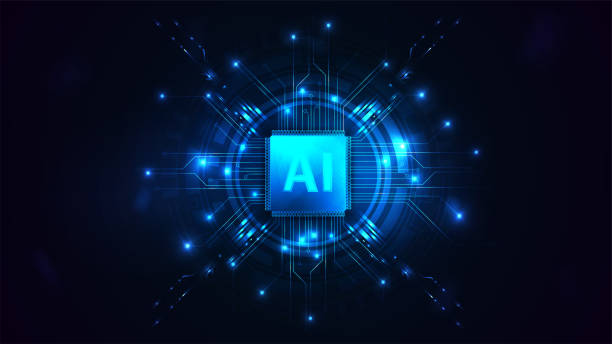
Contrary to the common perception that AI is merely a threat to jobs, there are numerous examples of successful human-AI collaboration, indicating that the future of the job market lies more in the coexistence of AI and humans.
In the medical field, AI can help doctors diagnose diseases more accurately; for example, AI systems can rapidly analyze radiology images or tissue samples with higher precision than the human eye, but the final decision and empathetic communication with the patient remain the responsibility of the physician.
In the automotive industry, AI robots perform assembly and quality control tasks with incredible precision, while human engineers focus on design, oversight, and innovation.
In creative sectors, too, AI acts as a powerful tool for increasing productivity; for instance, graphic designers and writers can use AI tools to generate initial ideas, optimize processes, or even produce basic content, and then enhance it with their creativity and expertise.
These examples show that the future path of AI jobs can move towards creating “Augmented Jobs,” where humans, utilizing AI capabilities, perform more complex and valuable tasks.
This collaboration not only leads to increased productivity but can also help improve the quality of work life and focus on the more human aspects of jobs.
Are you tired of your company website not meeting your expectations? With Rasaweb, design a professional website that truly represents your business.
✅ Increase acquisition of new customers and sales leads
✅ Boost your brand’s credibility and trust with your audience
⚡ Get a free website design consultation!
Human-AI Collaboration: The Future Model of the Job Market
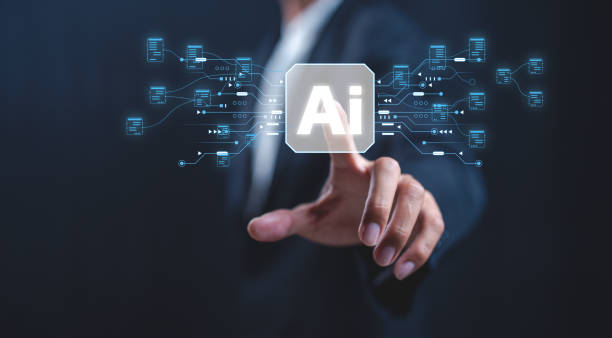
Beyond job displacement or creation, the dominant view regarding the future of AI jobs emphasizes collaboration and synergy between humans and machines.
This model means that AI, as an intelligent partner, undertakes repetitive tasks, large data processing, and pattern analysis, while humans focus on more complex, creative tasks requiring emotional intelligence, ethical judgment, and strategic thinking.
In this model, humans become the overseers and commanders of AI.
For example, in the legal sector, while AI can scan thousands of cases and documents to find relevant patterns, human lawyers use this information for complex arguments and client interactions.
This collaboration not only increases productivity and accuracy but also allows humans to focus on the more human and strategic aspects of their work.
Developing “metacognitive” skills, such as the ability to understand and collaborate with AI, as well as adaptability to rapidly changing work environments, is essential for this model.
This approach has the potential to create jobs that are both more economically productive and more humanly satisfying, indicating that the future of AI jobs can be shaped with a positive and constructive approach.
The Future of AI Jobs and a Vision for Future Generations
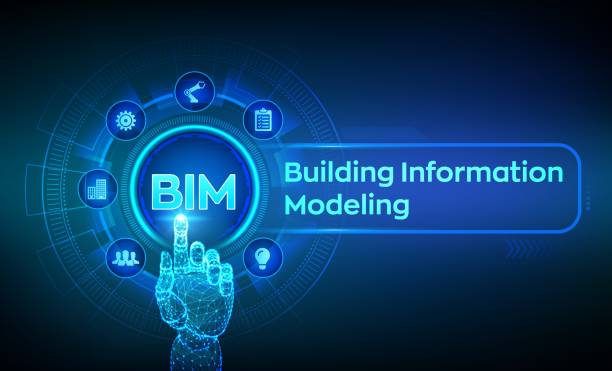
Ultimately, the future of AI jobs presents a complex yet exciting vision for future generations.
This future will be shaped not only by technological advancements but also by policy decisions, investments in education, and individuals’ readiness to adapt to changes.
The importance of lifelong learning and the ability to reskill and upskill has never been as critical as it is today.
Governments, educational institutions, and companies must collaborate closely to provide the necessary infrastructure for this transition.
This includes creating flexible training programs, offering social support for individuals affected by automation, and promoting a culture of innovation and human-AI collaboration.
Future generations must be educated in a way that enables them to effectively collaborate with AI systems, understand their capabilities, and utilize them to solve complex problems.
This means fostering critical thinking, creativity, and problem-solving skills, which will ultimately lead to the creation of new and valuable jobs.
The overall vision is that AI will lead to a world with higher productivity, but how this wealth is distributed and ensuring that no one is left behind will be the main challenge.
For future generations, understanding and embracing AI job transformations is not an option, but a necessity.
Frequently Asked Questions
| Question | Answer |
|---|---|
| What impact will AI have on the future job market? | AI will automate repetitive jobs, but simultaneously create new and more complex jobs in areas such as AI system development, maintenance, and training. |
| Which jobs are most at risk of being replaced by AI? | Jobs involving repetitive, rule-based tasks with low demand for creativity or emotional intelligence, such as some manufacturing, data entry, and simple customer service roles, are most at risk. |
| What skills are essential for success in future jobs with AI presence? | Skills such as critical thinking, complex problem-solving, creativity, emotional intelligence, data literacy, the ability to work with AI, and lifelong learning are of high importance. |
| Will AI cause widespread unemployment? | Some jobs will be eliminated, but history has shown that new technologies, instead of causing widespread unemployment, reshape the job market and create new jobs. The need for adaptation and retraining is crucial. |
| What new job opportunities emerge with the advent of AI? | Jobs such as Machine Learning Engineer, Data Scientist, AI Ethicist, Human-AI Interaction Designer, and Digital Transformation Consultant are among the new opportunities. |
| What is the role of education in preparing for the AI job future? | Education should focus on developing soft skills, computational thinking, digital literacy, and the ability for continuous learning to prepare individuals for future changes. |
| How can I prepare myself for the labor market changes brought by AI? | By learning new skills related to AI and data, strengthening soft skills, developing critical thinking and creativity, and adopting lifelong learning, you can prepare yourself. |
| Will AI ethics become an important job field? | Yes, given increasing concerns about biases, privacy, and automated decision-making by AI, the role of AI ethics specialists will become crucial to ensure its responsible development. |
| What is the importance of human-AI collaboration in the job future? | Human-AI collaboration, rather than competition, shapes the future of the labor market. AI can be a tool to increase productivity and allow humans to focus on more complex and creative tasks. |
| Which industries will be most affected by AI? | Almost all industries will be affected, but fields such as healthcare, finance, transportation, manufacturing, education, and customer service are pioneers in adopting and transforming through AI. |
And other services of Rasaweb Advertising Agency in the field of advertising
Smart Marketplace: A professional solution for attracting customers with a focus on precise audience targeting.
Smart Brand Identity: A professional solution for campaign management with a focus on SEO-driven content strategy.
Smart Marketing Automation: Professional optimization for customer acquisition using attractive UI design.
Smart Sales Automation: Professional optimization for increasing sales using attractive UI design.
Smart Digital Advertising: An innovative service for increasing customer acquisition through the use of real data.
And over hundreds of other services in the fields of internet advertising, advertising consultation, and organizational solutions
Internet Advertising | Advertising Strategy | Advertorial
Sources
Digiato: The Future of AI JobsISNA: Challenges of AI in the Job MarketMehr News Agency: AI Job OpportunitiesZoomit: The Impact of AI on Future Jobs
? Are you ready to transform your business in the digital world? Rasaweb Afarin, a leading digital marketing agency, provides innovative and targeted solutions for your growth and success, offering comprehensive services including custom website design, SEO, and content marketing. With us, establish a powerful and influential online presence and achieve your business goals.
📍 Tehran, Mirdamad Street, next to Bank Markazi, Southern Kazeroon Alley, Ramin Alley, No. 6

